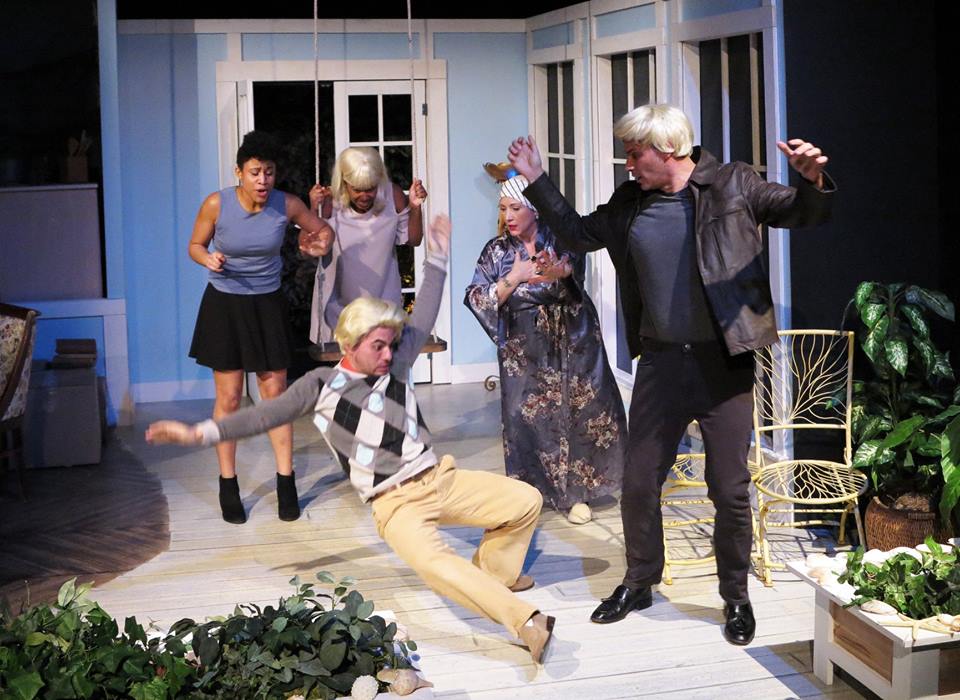Presented by Apollinaire Theatre Company
Written by Leah Nanako Winkler
Directed by Danielle Fauteux Jacques
Dec 21, 2018 – Jan 20, 2019
Chelsea Theatre Works
189 Winnisimmet St
Chelsea, MA 02150
Apollinaire Theatre Company on Facebook
Review by Diana Lu
(Chelsea, MA) Thanksgiving day. Generic WASP family, The Donnelly’s, converges on Two Mile Hollow, a family beach house. Younger son, Joshua, and daughter, Mary, are expecting drama with mother Blythe, but none are expecting older son Christopher to bring his “assistant,” Charlotte, especially not an “assistant”…OF COLOR. On this stormy night, secrets are spilled, social hierarchies are upended, and only one may leave with their self-esteem unscathed.
There are so many cringy racial issues in Apollonaire Theatre’s Two Mile Hollow, and I am not even talking about the plot. For a play satirizing whitewashing, yellowface, and racism, it had all the whitewashing, erasure of Asians, and racism of real life, with none of the comedy. Leah Nanako Winkler’s 2017 script, supposedly a satirical take-down of white family dramas and critique of the portrayal of POC in American media, completely missed the mark.
Before I get into it, I want to commend the exquisite set design, choreography, and the audio and lighting tech. They added so much drama, depth, and economy to the show. Also, Paola M. Ferrer’s performance as Blythe was exceptional. She was unapologetically and deliciously wicked as the ice-cold bitch of a matriarch, on par with Jessica Walter’s Lucille Bluth in Arrested Development. Now on with the critique.
Good satire is difficult to write. Even famous comedians fail. Winkler’s script was too focused on imitation and didn’t go far enough or mean enough on exaggeration. Satire is meant to absolutely eviscerate the existing power structure. It’s meant to say what everyone is thinking, but afraid to say. And it’s supposed to be completely over-the-top and laugh-out-loud funny.
When it doesn’t work, ironically bad dialogue is just a poorly written, overwrought script. Ironically racist, ironically exploitative plot, when it too-closely mirrors real life racism and exploitation, just comes across as racist and exploitative. Two Mile Hollow falls into this Uncanny Valley of satire, which only reinforces the stereotypes it tries to subvert. Winkler would have done better to go far bigger and more absurd in her characters’ dramatic actions than to ham-fist into the dialogue so many pop culture references that added nothing.
Even if it were executed well, this play’s very existence feels redundant. Two Mile Hollow is just another sad entry into the overdone genres of “white people by the water” as well as “POC writing white people”. Its time has passed and putting this on now is like jerking off a dying horse. (Actually, if Christopher was fatally injured in his motorcycle crash, and instead of being heartbroken, Blythe instructed Charlotte to jerk him off into a donation cup to “preserve the bloodline,” that would be great satire.)
I liked Charlotte’s story and perspective. It was true to who the playwright is, but her narrative was obfuscated by the Donnelly’s story. This made sense metaphorically—the POC sidekick gradually becoming the star—but it looks disjointed and schizophrenic onstage. Winkler doesn’t own her own story, and I would much rather see her stories, as a biracial woman living in Japan and the US, than to see the theatre world erase the nuances of her mixed-race identity, privilege inclusive, to pander to the same “diversity hiring” that she’s trying to skewer.
That brings me to this production’s casting. I thought it was strange that Winkler, an Asian woman, would write about a black woman’s racialized experiences. Upon more research, I discovered that Charlotte was written as an Asian woman, a fictionalized version of Winkler. That makes so much more sense, because the stereotypes Charlotte assumes—hypersexualized by white men, subservient and docile, pressured to be extraordinary (model minority myth)—are SPECIFIC to Asian women.
Apollinaire’s casting of Charlotte as a black woman doesn’t make sense, because the ways black women are racialized are different than the ways Asian women are. The fact that the production abjectly missed this nuance is another insulting erasure of Asian America and glaring proof that Boston theatre thinks anyone who isn’t white is interchangeable.
Speaking of poor casting choices, the show was marketed as having an all-POC cast, but three of the Donnelly’s were white-passing. There’s a scene in which Christopher is ecstatic to discover that he’s “1/18 Cherokee”. Now he can play Pocahontas without breaking any of the “diversity rules,” he says. These lines are spoken by a white-passing actor, in a role written for a POC. I face-palmed at the irony of this scene.
Let me be clear: this is colorism. This is whitewashing. I have personally seen many marvelous actors of color in Boston theatre. The entire family could easily have been played by non-white-passing people. It would have also been valid to cast white actors in these roles, but as is, their casting was excruciatingly tone-deaf. Mary was played by a black woman, and it was galling to see her constantly berated for being fat, ugly, lazy, and unremarkable by a bunch of white-passing people. The audience noticeably tensed when Ferrer sniped that she was “the black sheep”.
Two Mile Hollow was unfunny, cringe-worthy, and only served to reinforce the stereotypes it purports to dismantle. This production was rife with the same racist casting choices that the play (and gallery) attempts to mock, and served as another exasperating reminder that the very white media establishment
1. still thinks all people of color are interchangeable, and
2. still prefer their people of color to be as white as possible.
My partner and I considered leaving during intermission, and the only reason we stayed was for the review. It would not have been worth even a hate-watch otherwise.

